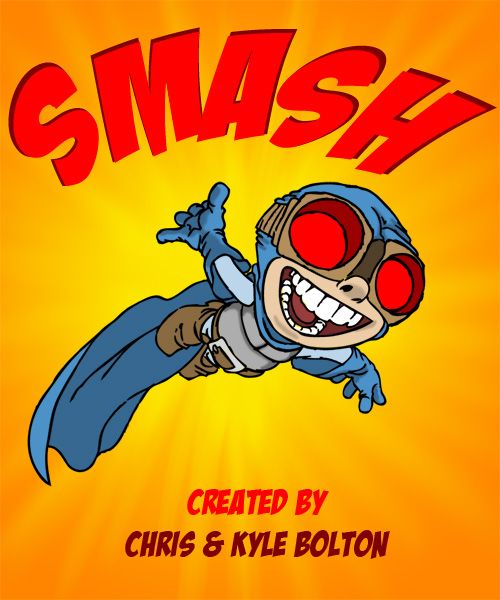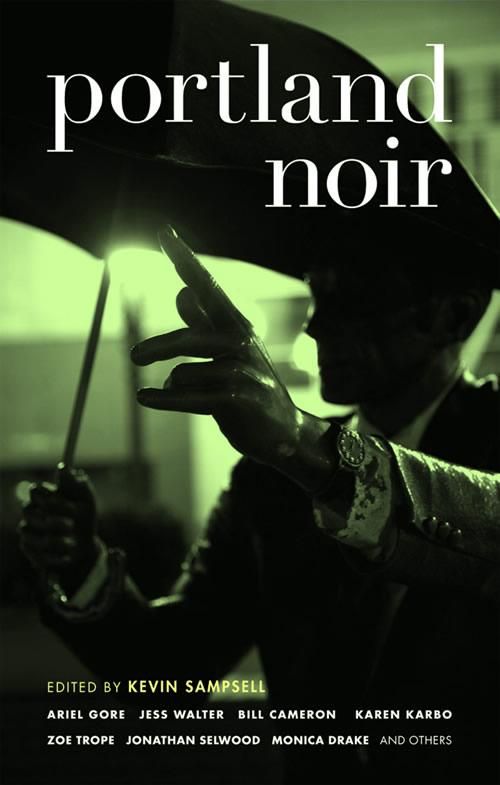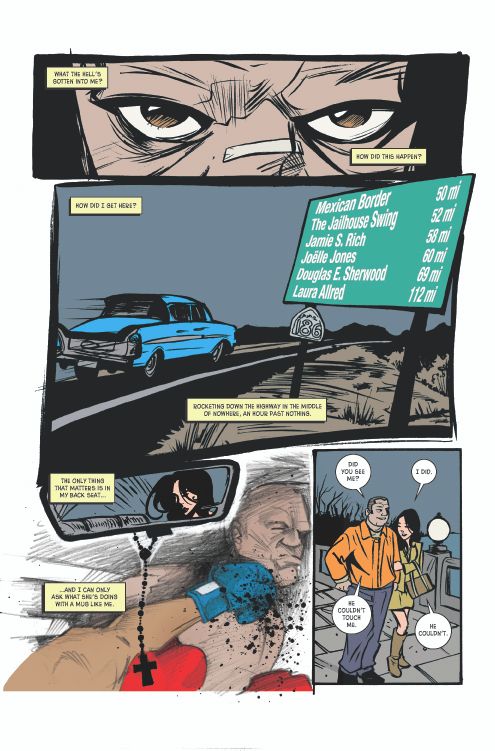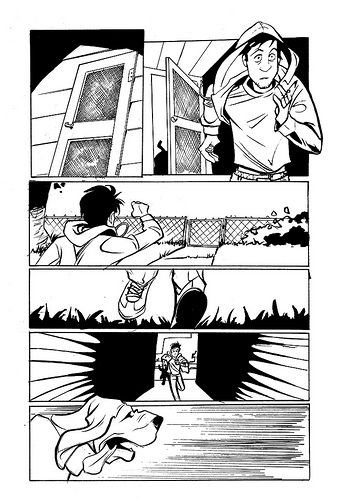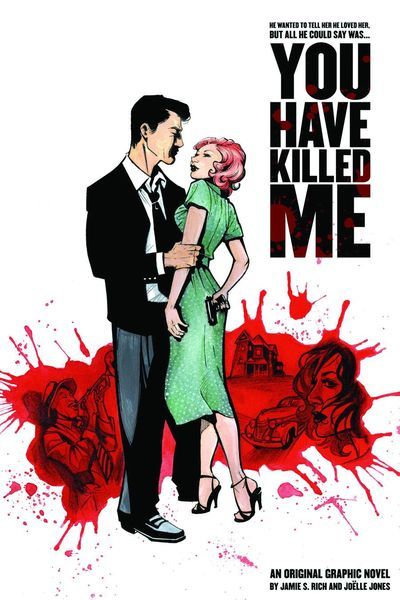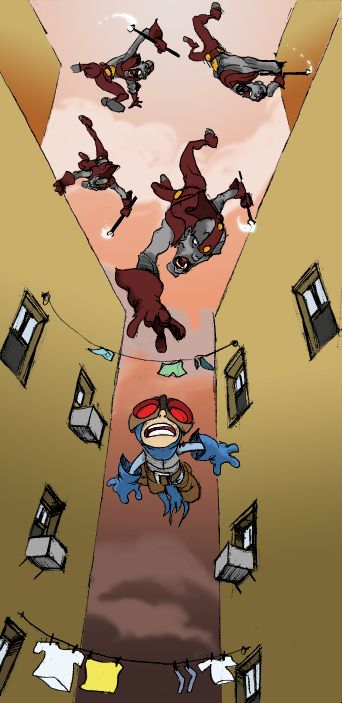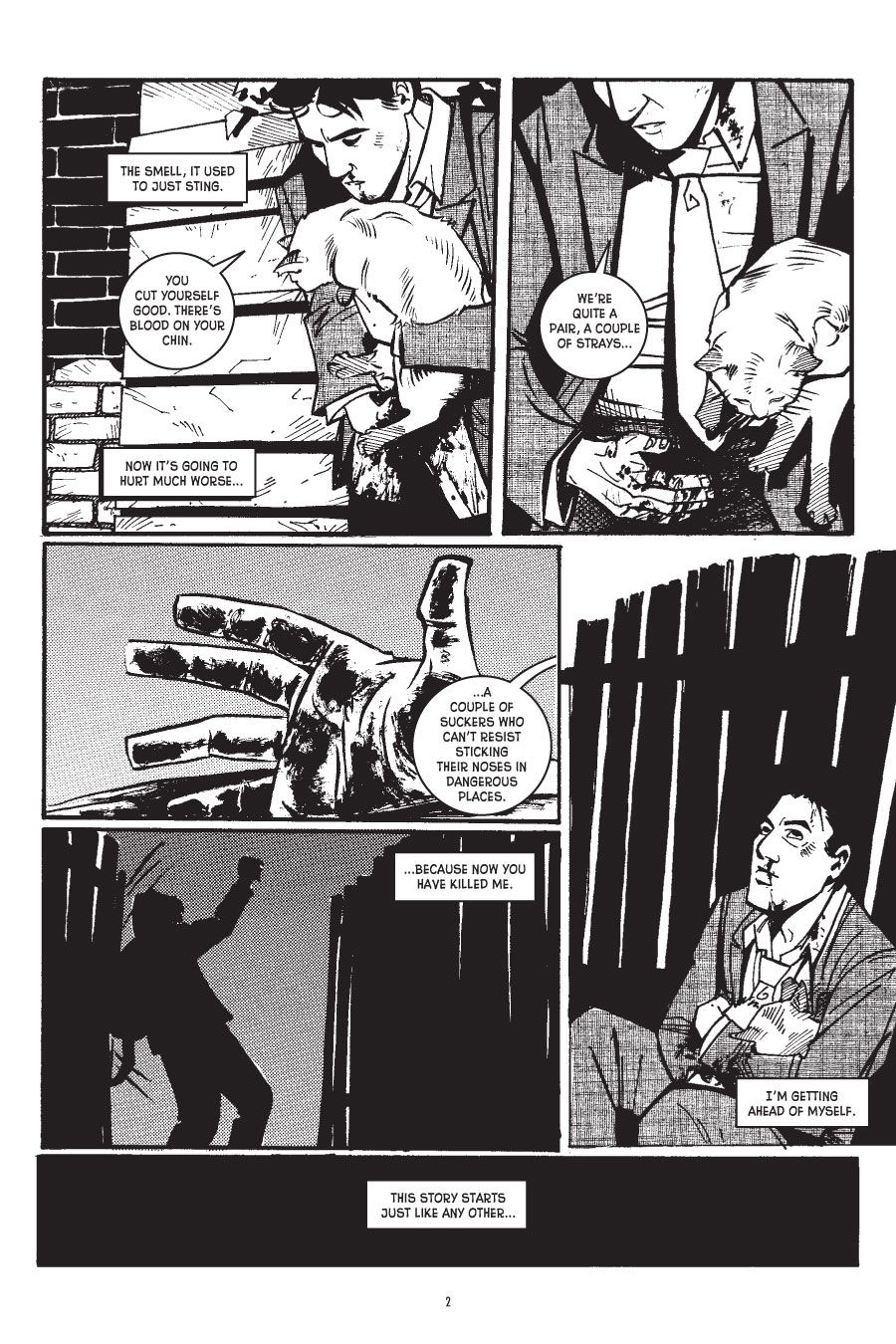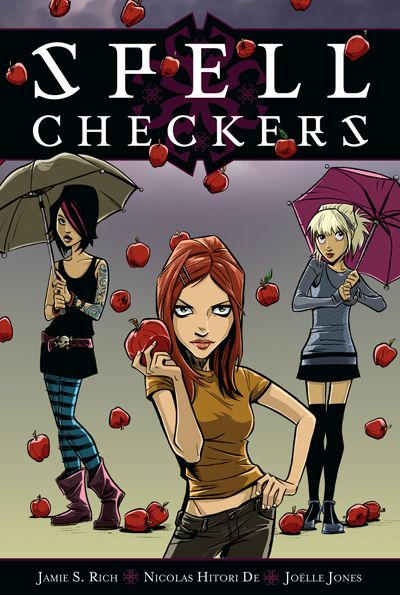Chris A. Bolton is relatively new on the comics scene, but the Portland-based writer is in the process of finishing the first run of his successful super-powered humor series, the online comic Smash (http://smashcomic.com/), drawn by his brother Kyle Bolton. Chris is also a filmmaker and a prose writer, and the fact that both he and I contributed a story to the pulpy literary anthology Portland Noir (Akashic Books, 2009) seemed like a good enough excuse for us to sit and chat. Especially since we're two guys who cross back and forth between media--in fact, his story in Portland Noir, "The Red Room," is prose, as is to be expected in the Akashic Noir series, while the story Joëlle Jones and I contributed, "Gone Doggy Gone," is comics, a rarity for the venue. Of course, these are topics we cover in the conversation, so without further ado....
JAMIE S. RICH: So, Chris, I suppose the best way to start is how you and I met. We both have stories in Portland Noir, the Kevin Sampsell-edited anthology that features crime stories set in the town where we both live. You and I started talking at an event for the anthology that was at Powell's Books, where you were reading and I was just hanging out. How did you end up in Portland Noir?
CHRIS A. BOLTON: First off, Jamie, thanks for inviting me to chat. In my day job, I work for Powells.com, sometimes doing data entry for book pages. A few years back, in 2005 or so, I was beefing up the pages for Akashic's Noir series when it occurred to me that there should be a Portland Noir. I emailed Akashic to inquire about it and they said they were planning to do one at some point in the future.
Fast-forward to spring 2008: I read in The Oregonian that Akashic was seeking submissions for the Portland anthology. And it was being edited by my co-worker, Kevin Sampsell, whom I knew mainly through email exchanges.
And what led to your specific story, "The Red Room"? You get to use a setting that is pretty unique: your workplace, Powell's City of Books. For folks who aren't from Portland, that's one of the largest and most revered bookstores in the U.S. It's just huge, and it has both new and used books. The graphic novel sections would blow most comics fans' minds.
I'd like to say it came to me instantly, but that would be lying. Each story in the Akashic Noir books is set in a different part of town, to give a feel for the overall city. My initial thought was to write about the Sunnyside area, since I've bounced around there for most of my ten years here, but that failed to generate much in the way of story ideas.
I can't recall precisely when Powell's jumped into my head, or why.
(Random aside: I need to start jotting down the genesis of ideas, because for some reason the lightning bolt is the first thing to eject from my memory. I've done a few interviews for Smash, and the first question is almost invariably, "What was your inspiration for the character?" I have a vague recollection--enough to provide a semi-coherent answer--but I cannot for the life of me recall my Dr. Frankenstein moment when I threw my head back and hollered to the stormy heavens, "Eureka! SMASH IS ALIVE!!!")
Anyway, as soon as I thought of Powell's, the years of colorful stories I'd heard from co-workers came flying at me, and I knew I had something. After all, it's a bookstore that encompasses an entire city block and is four stories tall! A lot of devious things can happen in that much space, and a great many honorable intentions can go horribly, utterly awry. I emailed Kevin with the idea and he was intrigued.
What about you? Did you come up with "Gone Doggy Gone" on your own impetus, or was it conceived specifically for the anthology? And did Kevin approach you, or did you come to him?
Kevin came to me. He knew that there was such a vibrant comics scene in Portland that it had to be represented somehow, and so he started to feel around for someone who might be willing to do it. I knew him from the late '90s or thereabouts, when we were both writing reviews for some of the Portland arts papers. He actually set me up with a reading at Powell's in 2000 when my first novel, Cut My Hair, was coming out. It was only after that I found out what a big deal that was, you just don't walk into Powell's and get a reading.
It was the perfect book at the right time for Joëlle and I. We were already working on our own crime-related stuff and were maybe about halfway through You Have Killed Me and Oni Press was on board for publishing it. I had also written, and I think she already drew, "The Jailhouse Swing" for the third Popgun, which was our boxing story. We both like stories where boxers are used as the heavies.
Anyway, I doubt Kevin knew that, but I had heard of the Akashic Noir series and jumped at it. I almost immediately had the idea that I wanted to work in my neighborhood, the upper Northwest, and I wanted to do something about a lost dog. It's loosely based on a sort of true, sort of urban legend from the neighborhood. A dog had gotten stolen, and there were these posters everywhere, it was on MySpace, the award kept getting bigger. I took that idea and thought, okay, where can that dog be and who should find him. I tied it back into the notion of Portland being a comics town by making our main character an indie cartoonist. It all kind of fit.
I remember asking you why you hadn't done a comic when we ran into each other, actually.
Honestly, it never occurred to me to submit a comic--but after I heard what you and Joëlle were doing, I was instantly envious! Kyle and I have talked about doing a noir comic based on Prohibition Rose, Portland's legendary bootlegger (who was, to my knowledge, the only woman bootlegger in the country), and I realized too late how perfect that would have been for this book. But you never know, maybe there will be a Portland Noir II...
There may have been one other city that had a comic story in the book, I am not sure. They kept calling it a "graphic story," and I was like, "No! That makes it sound like it's full of sex and violence!"
I've heard it was Wall Street Noir. Which... I mean, really? Does Wall Street scream "comics" to you? Makes me curious to check it out.
I guess we'll never really come to terms with the whole graphic novel/comic book labeling issue. At least manga has a name everyone can agree on!
So, have you participated in any of the readings yet? (And how would that go, exactly? Would you describe the panel to the audience or use an overhead projector?) Kevin does a great job hosting the events, coming up with a noirish intro for each writer. In mine he mentions my "suspicious" middle initial, wondering what it could stand for: "Adolf, Anarchy, Abraham? The mind races with possibilities."
For the record, it's "Addison." (Not nearly as cool as the suspicious versions.) I added it mainly because there are a great many Chris Boltons in this world. There was even another Chris Bolton working at Powell's a few years back, which caused much confusion.
As a fellow middle-initialer, I wonder how you feel about this. Did you add the "S." to be mysterious, or controversial...or because you run into a Jamie Rich everywhere you go?
I get asked about it all the time, and I haven't told anyone what it is in years. I never go on the record, and it became a gag with some local baristas at a coffee shop where I used to go and write, they'd write different guesses on my coffee cup. For me, I don't think I've ever run into another Jamie Rich, though I get Google Alerts for a guy who runs the Gay & Lesbian Film Festival in Kansas City. I added the middle initial when I was 10 or 11 because I was tired of being told I had a "girl's name" and decided to spruce it up. It just kind of stuck. It's funny, because I get annoyed when people refer to me verbally as Jamie S. Rich like it's some ostentatious thing, and I get annoyed when they drop it from something in print. You can't win with me.
I haven't done any readings for this story, but I did a performance of "The Jailhouse Swing" once. I broke it down by panels and did a power point. I also once did a reading from 12 Reasons Why I Love Her, my first book with Joëlle, where I took a few pages of script and pared it down to the essential narration and read it as a dialogue between the two characters. It worked pretty well.
Now, people are always curious when they talk to me about the difference between writing comics and prose. It seems to boggle the mind that one might do both. Personally, I have no problem going from one to the other, they serve different functions for me. What draws you to do something in prose vs. doing it as a comic story?
The biggest factors in choosing my medium are probably difficulty and available resources. In July I premiered a web-series called "Wage Slaves" (www.WageSlaveSeries.com) that I shot last summer, and spent most of the past year doing postproduction. Shooting a film or web-series is a huge undertaking, even with a minimal budget, so I have to really love a project to endure all of that. [IMG: cast.jpg]
By comparison, sitting down by yourself and creating all of the characters, settings, and dialogue on a piece of paper feels like a vacation. When it comes to prose, the strongest advantage for me is Voice. You can work that into film and comics, of course, but prose is where the author's voice is strongest because it's pervasive; if all you have is the author's words, then you're completely at the mercy of her Voice.
The only comic artist I'm involved with creatively (or even personally know) is my brother Kyle, who's too busy with the artwork for Smash to work on anything else, so that presently limits my options with comics. I hope that will change once we start hitting the convention circuit this year and I get to meet more artists.
I imagine you have a handy list of artists you can call up besides Joëlle when you have a comic idea. Does the nature of the project determine who you want to draw it, or is it more a matter of who's available and/or interested?
These days, I tend to write for the artist, I don't sit there and dream up a story and then wonder who might come with me on the expedition. In finding both Joëlle for 12 Reasons and Marc Ellerby for Love the Way You Love, it seemed like an endless trek to cast the right artist. It wasn't much fun, and I think part of that was trying to match something in my head, whatever vague image of what the book was supposed to look like. The flipside is now I have scripts, particularly for Joëlle, where I feel like I'd rather they not get done if she can't draw them. I don't want to readjust my thinking. I guess I'm an all or nothing kind of guy. Like, I would never want to work with anyone else on any follow-ups to You Have Killed Me. It just wouldn't be right.
I think, especially in that case, the reader would also feel it wasn't right. More and more I find myself envying the writer/artist "two-fers," creators like Jeff Smith, Art Spiegelman, Alison Bechdel, and Craig Thompson, who don't have to rely on a creative partner to tell their stories in comic form.
On a related note, I love the portrait of the Portland comics scene in "Gone Doggy Gone," with the split between mainstream and indie creators. How close-knit is the Portland comics scene? I'm still a stranger to the community, but I hope to get a little closer after next year's Stumptown Fest. The fest has filled up before the application deadline two years in a row; next year we're submitting our application two seconds after they open!
A couple of years ago, Scott McCloud gave a presentation at the main branch of the Portland library where he noted that comics tend to be tribal, and that Portland is full of many tribes. (Though, now that I say this, I am starting to wonder if it was Scott or Douglas Wolk who made that point…) I elbowed Joëlle and said we must be our own tribe, since we tend to mostly hang out with ourselves. It's a little high school. The cliques all get along, but we still have cliques. That's also just geography, we are scattered. When we do come together, though, it can be fun. The Top Shelf guys hang out with the Oni guys, the different comic book store owners go to each other's events. I guess things have changed a little, too, since I've joined a book club that is all comic book professionals. It's really fun, though sometimes our literature discussions get derailed by industry gossip.
I like the notion of comic tribes roaming this city. Right now I'm something of a ronin, but I'm always looking for a group to join forces with. Maybe that should be a Craigslist ad: "Comic-writing ronin seeks like-minded samurai for Southeast Portland-based tribe."
Of course, in addition to your comics, you've written several novels yourself (including Cut My Hair, which I read in 2001 and completely related to). What makes you decide which form to use for which idea? What are the different functions that you mentioned?
Honestly, it's never a question for me what form an idea will take. I either have a comic book idea or I have a prose idea. I just know when it hits me. It's weird, I have a hard time getting some people to understand that, and I've been pretty adamant against switching gears midway. I have a script called This World and Body that was once suggested to me would be an easier "sell" as prose, and it made me have very violent thoughts against the person suggesting it. It's a script that is so fundamentally visual, to turn it into prose would be to suck the specialness right out. Like plucking the feathers off a chicken and sending it on its way. People are just going to wonder what happened to that chicken.
I love that analogy! It's just a shame Hollywood so often ignores the chicken and lunges for the handful of feathers. I wrote a screenplay for an animated film about lemmings that got some nibbles, but was ultimately deemed "too dark" for kids. Apparently, even the notion of mass suicide is a turn-off. But if you asked any child what a lemming is, they'd tell you (erroneously) it's a little rodent that stampedes to its death in the ocean. So, what's the problem here?
I've often considered trying to adapt it into a children's book or a comic series in the Asterix vein, but each time I try...well, your chicken analogy never occurred to me before, but it certainly will from now on.
Recently, I wrote a prose sequel to Love the Way You Love, and it was one of the toughest things I've ever done, just changing how I viewed the characters, getting a prose groove going. Even though it was successful, the difficulty of it...well, I think it proved my point. "Don't do that again!" For me, comics provide something a little looser, a little more free, while also more tightly structured--you must work within pages and panels, it must be a certain length. It's where I can collaborate, where I can start the process and let someone else finish it and share ideas. Prose is more private, it's all me. There's a split that fits my Gemini personality. Again, it keeps being all or nothing with me.
In your "Red Room" story, there is a feeling that some of the participants in the crime aren't really criminals. They are playing "dress-up," as it were, they are taking on the role and almost living out a fantasy. Is this something you thought about? Is it maybe a theme of yours? I ask because I don't think your Smash character is that different in that sense: it's a little kid putting on a costume and being his favorite hero. It's like Calvin actually getting powers in Calvin & Hobbes--which I guess would make him Captain Marvel, talking tiger and all, wouldn't it?
I hadn't really thought about that, but it makes a lot of sense. I try to avoid easy labels and flip expectations whenever possible, and I'm also enormously fascinated by the various roles people play in their own lives. Perhaps it comes from spending so much time in a day job and having to clarify to people that I'm really a writer/filmmaker/ballerina/what-have-you.
In the case of "The Red Room," I didn't want any of the characters to be what they seemed--the client wasn't really an anarchist punk, the crooks are actually cops, and the main character is definitely not a detective or an action hero. In fact, strangely enough, I envisioned him very similarly to the way Joëlle draws Craig in "Gone Doggy Gone."
Wow--I guess you're right about Calvin turning into Captain Marvel. Although, I think Stupendous Man would have wreaked a lot more havoc...and I can't imagine Calvin with actual powers staying on the side of good.
Incidentally, I like Captain Marvel (well, I liked Jeff Smith's version of him), but I think the major flaw in that character is he becomes an ADULT superhero. When I was a kid, I didn't want to be an adult--I didn't really like or understand adults. I wanted to stay a KID, but have the freedom to do what I want--and super-powers, of course. Rather than the kid being the hero of the story, with Captain Marvel it's like they just rolled the hero and the sidekick into one body.
Yeah, I wanted to be a kid that had extraordinary abilities and could whoop an adult's butt. That's the sweeter revenge. "You think I'm a weak kid? I'll show you!"
I just took a Facebook quiz the other day, the one where it tells you which Calvin alter-ego you are, and funnily enough, I got his private detective persona, Tracer Bullet. I didn't cheat or anything. And that oh-so-insightful quiz leads me to why I asked the question, that there is something inherent in what we do, regardless of genre, that is fundamentally us whether we know it or not. One of the common reactions to You Have Killed Me is surprise at how well I have transitioned from relationship literature to a pretty straightforward genre piece, and in answering that, I realized--and so did some of the askers--that my previous characters aren't all that different. I write about people searching for something, looking for answers to big questions, and a dead body can just be a stand-in for a personal foible.
And maybe now people will stop wondering, "Did this really happen to you?" Or I can pull my gat out of my trenchcoat and say, "Yes, yes, it did."
I took that same quiz and my result was "Safari Al," a character so obscure that, despite re-reading every Calvin & Hobbes book each year for the past 20 years, I didn't recognize him. (He was in one strip, which I remembered once I found it, but the mention of his name is so brief and insignificant that it sailed right past me.) I don't know what to make of the implications of that, so I'm trying not to read too deeply into it. At least he carries a machete.
As for your "transition," I'm not at all surprised by it. I felt that 12 Reasons Why I Love Her had a genuine noir edge: the search through the past for answers to something inherently unknowable, Joëlle's use of chiaroscuro lighting (I recall at one point there's even the noir staple of light slatted through blinds), and the nonlinear storytelling, which used to be almost exclusively confined to the crime genre (you had to go backwards and forwards to figure out how and why the crime happened) but has recently become more accepted into "mainstream" storytelling. It was noir looking for a crime, and I can't wait to see what happens with You Have Killed Me.
12 Reasons is one of those books that jumped off the shelves at me, and every single page was impressive. I must confess, I did slip into the trap of wondering, "Is this based on the writer's experience?" I think it's nearly impossible to avoid that when it feels like a very personal and intimate story. That seems like it should be a compliment to the writer, but I think it's more of a frustrating no-win situation. If you took it from your own life, there's an implication that you didn't actually have to write (as in, create) anything (WRONG). Whereas, if it is fiction, it's great that you "fooled" the reader, but they're probably going to think you just took it from your own life anyway.
Yeah, you have to be kind of polite and nod when people say that, and tell them no, it isn't me, that didn't happen, etc. Naturally, some of it did, some germ of reality makes it through, but I'm usually quite honest and say that the things that did happen would surprise them in how obscure and insignifcant they are. Though, none of You Have Killed Me is based on real life at all. Except me and Mercer both like having conversations with cats.
It's funny, I have a hard enough time getting words on paper the way they first arrange themselves in my head, I can't imagine trying to be true to an actual event. It always changes. It's like when people look at a performance by someone in a movie and say, "He is just playing himself," like that's nothing. I always say, "Can I put a camera on you, then, and have you recite lines I wrote for you?" They'd find it's not so easy.
You and Joëlle seem like a perfect creative match. Is the collaboration as smooth as it appears, or are there ever disagreements and friction?
Nothing too dramatic. We've had points where we haven't fully agreed on a decision, but we always talk it out. It's never turned into a big deal. It's usually just moving stuff around, maybe changing how we approach something. I've never changed a word of dialogue, though, I don't think, and I've never made her redraw a panel to match my own vision. We both are pretty respectful of the other's instincts, and once we hear the case for why something is the way it is, we trust the other person. With You Have Killed Me, we talked about the story as I wrote it, so any major objections on her part could be sorted out sooner rather than later. Stuff like layouts or small, inconsequential details that don't play well on the page, that's her prerogative to edit out.
What about you? You're working with your brother, so is there sibling rivalry or old childhood resentments that ever come out? Did you guys create Smash together?
Most of our friction comes from the involuntary muscle spasm siblings develop when they have to share a bedroom for the first ten years of their lives. Luckily, we've managed to overcome that "You aren't the boss of me!" pettiness. I almost never give Kyle notes on his art anymore--I agree with your notion that it's the artist's prerogative. However, I sometimes have to remind him that I need to include a large chunk of exposition in a given panel, and if he doesn't leave me room at the top, someone is going to get his head chopped off by a razor-sharp plot point.
The only real difficulty I have anymore is having to defend small details that are present for the sake of the narrative. I like to toss out a lot of plot/character seeds that can sprout later, or just lie there unnoticed if I decide not to use them. But if Kyle doesn't understand why something's there, he'll challenge me on it--which is good, because then I have to explain my thought process: "This is because, in episode three of Season 2, the Magus is going to buy a Cold Stone franchise, so I'm setting up his childhood love of ice cream that the reader didn't realize at the time would be a major plot development..." In doing so, I sometimes realize what a lame idea it is (the Magus is not buying a Cold Stone franchise). Other times, Kyle confirms that it's a good idea, and even seems impressed that his older brother is capable of plotting that far ahead.
We didn't actually create Smash together: I came up with the initial concept, he designed the character, and it evolved from there. Since then, I would say it's been a very mutual collaboration--there's no element of the series, from the characters and their backstories to their costumes and powers, that we don't contribute to equally. And sometimes, fight about passionately...but always for the good of the comic!
In writing crime, I find it's far more exacting than the relationship stuff. I had to go back a lot and lay down things I didn't now I needed. Like, "Stick a razor in his desk drawer on this page so people won't be confused when he shaves on this next page." I was done with You Have Killed Me before Joëlle even started, so it was pretty easy to make sure she knew what was important and what may just be my fanciful thinking.
What's next for you, Jamie? Do you have any plans to revisit Craig from "Gone Doggy Gone"? Could there be a noir series about a down-on-his-luck indie comic creator who keeps stumbling into the criminal underbelly of Northwest Portland?
Nah, Craig is dead and buried in my mind. I had such a hard time writing that story, he's not really my favorite boyfriend right now, anyway. It's funny, it was one of the more difficult things I've ever worked on. There is an unfinished earlier draft, and a whole other separate script called "You Cross My Path" that has nothing to do with a dog or cartoonists or anything that we decided not to do in favor of "Doggy." It's way, way darker, plays up the anti-California xenophobia you find in Portland, as well as an old school punk vs. young hip-hop white suburbanites. And indie rockers. And drug-dealing cabbies.
My immediate future is another left turn, a high-school comedy about witches called Spell Checkers that Joëlle and I co-created, and we're working with an artist from France named Nicolas Hitori de. That's the one thing that's in production. I have some prose that I am currently shopping around, some stuff with Joëlle we hope to get to one day--she's a busy girl. She's doing Dr. Horrible comics for Dark Horse, and some issues of Madame Xanadu for Vertigo, and she's got lots of offers besides.
What about you? To wrap this up, what's the plan for Smash? You have "Season One" just about finished, correct? What is next for the little guy, and are there non-Smash comics in your future?
I've caught an online preview of Spell Checkers and I'm really looking forward to it. However, I'm dismayed to discover I haven't pointed something out yet, so let me say for the record: Joëlle's art is fantastic! The idea of her illustrating a Dr. Horrible comic fills me with enough glee to break into song. (Almost.)
Right now I'm busy planning and writing the next seasons of Smash and "Wage Slaves." This summer, Kyle and I had planned to work on a pitch for a new comic series, a supernatural comedy-thriller, during our (brief) hiatus from Smash. But we're also seeking a publisher to put out a Season One collection, so we're finding our hands a little fuller than we'd anticipated. Still, it's hard to complain about that.
Every now and again, I find myself pulling out the ol' Moleskin notebook and scribbling another chapter of a novel with my protagonist from the Portland Noir story. Except I'm going to have to change his name. He was dubbed "Jacob Black" a long time before a young adult romance novel about vampires became a huge success and the former Cedric Diggory forever claimed that title for himself.
And on that note...thanks again, Jamie, it's been fun! Anytime you want to continue this chat over beers, just drop me a line.
Sure. But if we're going to sit around and talk about more crime, make it something stiffer. We're writers, we've got a reputation to uphold! [insert laughter here]


